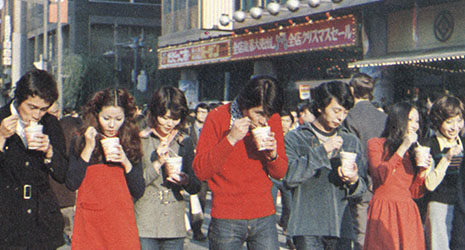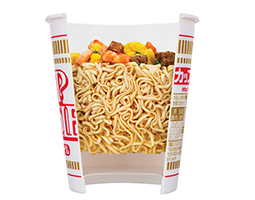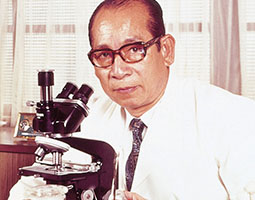Home > Highlighting JAPAN > Highlighting Japan May 2018 > From Japan to the world
Highlighting JAPAN


Instant World Cup
Behind the story of cup-type instant noodles are the setbacks and challenges that the inventor of instant noodle experienced during his quest to make them a global food.
CUP-type instant noodles are now a common dish for people around the world. Affordable, convenient, and now more nutritious than ever, they satisfy the various needs of consumers.
The inventor of instant noodles, Momofuku Ando, had dreamed of developing ramen noodles that people could eat anywhere conveniently. The founder of Nissin Foods, he encountered a cultural and culinary roadblock when he traveled to the United States in 1966 to introduce supermarket buyers to his Chicken Ramen, the world’s first instant noodles. As Haruka Aoki from the Corporate Communications Division at Nissin Foods Holdings explains: “At the time, Americans did not possess chopsticks or the right bowls for preparing instant noodles.”
Ando watched as the supermarket buyers—lacking the proper bowls and utensils—broke the noodles apart and placed them inside paper cups, poured hot water on top and then ate the noodles with forks. He realized that the key to making instant noodles a global dish was to adapt them to food cultures around the world.
After returning to Japan, Ando started developing a new instant noodle product stored in a heat-resistant container to allow consumers to hold the container in one hand while eating the noodles. He tested close to forty different prototypes before arriving at the ideal-sized cup.
Putting the noodles upright inside the cup also turned out to be problematic: they would tilt or flip over, and not settle properly. So Ando seized upon the concept of “reverse thinking.” Instead of depositing the noodles inside the cup during the production process, the noodles would be laid upside down, the cups would be placed over them, and be turned over later. His idea worked, and his factory went into mass production.
In 1971, Nissin’s Cup Noodles—the world’s first cup-type instant noodles—launched in Japan. The benefits of this unique product were not fully understood at first, and many stores would not place Cup Noodles on their shelves. But when sold in vending machines that also dispense hot water, the product became a big hit. Two years after achieving success in Japan, Cup Noodles crossed the Pacific and the product was marketed in the U.S.
In 2017, approximately 21.2 billion servings of cup-type instant noodles were sold around the world. Although the tally was less than the 78.9 billion units of bag-type instant noodles purchased, cup-type instant noodles now hold over half of the instant noodle market in countries such as Japan, Mexico, Chile, Costa Rica, Guatemala, Germany and Spain.
Cup-type instant noodles often reflect the respective dining cultures of the countries where they are marketed, both in local tastes and ingredients and even the texture and length of the noodles. Even the size of the cups varies. “In the Philippines it’s customary to eat smaller amounts much more frequently, so it have been popular for smaller cups in that market,” explains Daisuke Okabayashi, the manager of the Corporate Communications Division at Nissin Foods Holdings.
As times and tastes change, cup-type instant noodles continue to evolve. Ever since the mid-1990s, as interest in healthier eating habits began to rise, the product has gone through gradual improvements. Consumers can now choose from a variety of options, including products featuring nonfried noodles, dietary fiber, low sodium, lower calories and larger servings of vegetables. There is no doubt that cup-type instant noodles will continue to change to suit consumer tastes.
© 2009 Cabinet Office, Government of Japan








